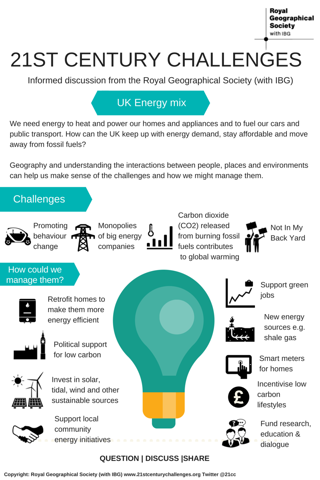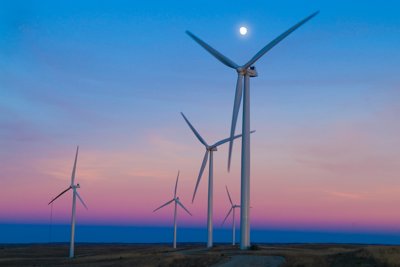What’s the challenge?
The UK Government’s overriding priorities with regards to energy policy are to deliver secure, reliable, clean, affordable energy. This presents policy-makers in Government with a ‘trilemma’: how can the UK decarbonise its energy system to meet the legally binding targets under the Climate Change Act and international commitments, whilst ensuring both security of supply and that energy is affordable for consumers? Panellists at the Policy Forum event held in November 2016, considered the dimensions of this ‘trilemma’, how this can be delivered upon in the context of the UK’s vote to leave the EU (‘Brexit’) and the importance of scale when designing energy policy.
Burning fossil fuels contributes to climate change: Fossil fuels like coal and oil contain a high percentage of carbon and burning them releases carbon dioxide. Carbon Dioxide is a greenhouse gas that traps heat in the atmosphere resulting in global temperature rises. Rises in temperature increase the likelihood of extreme weather events such as storms, droughts, heat waves and floods. Changes in temperature can also impact on agriculture and food prices, infrastructure, human health and human and animal migration patterns.
Fossil fuels are running out: There is only a finite amount of coal, oil and natural gas in the world and supplies are running out.
Changing society: Much of society is reliant on fossil fuels so it can be hard for people to transition. Government, business and the public around the world need to work together to develop new low carbon technologies and transition to using them.
It is impossible to live in today’s world and not come across the phrases ‘low carbon energy’ ‘carbon footprint’ and ‘carbon emissions’. As our awareness of and concern for climate change grows, the issue of carbon, and more importantly low carbon energy, is very much a 21st century challenge.
Every aspect of our daily lives, from heating our homes, driving our cars, transportation of our food and manufacture of our clothes, involves the burning of fuels and therefore the emission of carbon into the atmosphere, but does it have to be this way? Are there cost effective, sustainable and viable alternatives that will support economic and social development without compromising the environment?
This module focuses students to look at the energy possibilities and suggest strategies to tackle this very real 21st century challenge.
What is renewable energy?
Renewable sources of energy include:
Wind: Wind can be used to turn the blades of wind farms which generates energy. Wind farms can be found both on land (onshore) and at sea (offshore).
Solar: We can use the power of the Sun to provide us with energy. We can do this passively, for instance by designing houses with south-facing windows to maximise light and heat, or actively by installing solar water heating or Photovoltaic solar panels (PVs). Solar water heating uses collectors, usually on the roof of a building to capture and store the sun’s heat via water storage systems. Collectors provide heat to a fluid that circulates to a water tank. The heat is normally used for heating water in houses, commercial and industrial buildings. Photovoltaic solar panels (PVs) convert sunlight directly into electricity. PV’s can vary from small panels for use in homes, to large collections of panels which act as separate solar power plants and contribute directly into the electricity grid.
Nuclear: Since the 1950s nuclear power fuelled by imported uranium has generated a significant proportion of electricity in the UK, reaching a peak of 30% of electricity output in the 1990s.
What about biofuels?
Biofuels are fuels made from biological material which offer an alternative to oil based fuels like petrol and diesel. Plants that are high in oil (sunflower/palm/rapeseed) can be turned into diesel to use in transport. Biodiesel can be used alone or combined with normal diesel. Ethanol can be produced from crops such as sugar cane or from cereal crops high in starch such as corn and maize. Ethanol can be mixed with petrol to fuel cars.
However growing plants to use as fuel takes up valuable land that could be used to grow food and uses a lots of energy and water in production so biofuels are unlikely to be sustainable in the long-term.
Carbon Capture and Storage (CCS)
Carbon Capture Storage is a technique for trapping carbon dioxide as it is emitted from large point sources, compressing it into a liquid, and transporting it to a suitable storage site where it is injected into the ground. The UK has one of the most comprehensive programmes in the world to help create a new CCS industry (Source: Gov.uk)

21st Century Challenges held a panel discussion on 26 March 2008 to discuss the issue.
Lord John Browne, Member of House of Lords, President of the Royal Academy of Engineering, former Chief Executive of BP.
Lord John Browne, former group Chief Executive of BP, is one of the most respected businessmen in Britain today. Widely admired for taking the energy giant ‘Beyond Petroleum’, Lord Browne has an unrivalled knowledge of the commercial and technological questions surrounding low carbon energy. With current positions as a cross-bench member of the House of Lords and President of the Royal Academy of Engineering, Lord Browne is one of the country’s most prominent authorities on low carbon energy
“The challenge is to keep employing low carbon solutions quickly and at scale in the years ahead, and doing so is going to require an iron clad partnership between four groups: government, business, engineers and NGOs.” Lord John Browne
“We have to reduce carbon emissions by between 8 and 12 gigatonnes per year by 2058, an amount greater than the total global emissions today – an enormous challenge when set against the 50% increase in population, and significant increase in living standards, expected during the same period.” Lord John Browne
Malcolm Wicks, MP for Croydon North, former Minister for Energy within the BERR
Malcolm Wicks MP has served in the Government since 1999 when Tony Blair appointed him a junior Minister in the Department for Education & Employment. In July 2001 he moved to the Department for Work & Pensions where he was promoted in 2003 to Minister of State for Pensions. Following the General Election he was appointed Minister for Energy in the Department for Trade and Industry. In November 2006, he took on the position of Minister of Science and Innovation in the same Department. Following Gordon Brown’s succession as Prime Minister, Malcolm was appointed Minister for Energy in the new Department for Business, Enterprise & Regulatory Reform.
“Climate change is the global problem par excellence, requiring international solutions. It goes hand-in-hand with the geopolitics of energy supply and demand, which is an aspect of the nation’s security.” Malcolm Wicks MP
Professor Chris Rapley, Director of the Science Museum, what he thought.
Chris is well known as an expert in climate change science and was previously Director of the British Antarctic Survey. On the 29th of January 2008 it was announced that Professor Chris Rapley CBE, Director of the Science Museum, has been awarded the 2008 Edinburgh Medal for his work on climate and climate change. Prof. Rapley will visit Edinburgh in March to address what he believes is the most serious issue facing humanity – the potentially catastrophic consequences of global warming. The Edinburgh Medal is supported by the City of Edinburgh Council and will be awarded on Monday 31st March 2008 during the Edinburgh International Science Festival. It is a prestigious award given each year to men and women of science and technology whose professional achievements are judged to have made a significant contribution to the understanding and well-being of humanity.
“Finding new ways of organising society, rewarding people, providing them with not only their material well-being but also their spiritual well-being, and which does not require infinite growth in use of materials and impact on the world, is the key that we are yet to find.” Professor Chris Rapley
“We have to do three things with the carbon limit we have: achieve greater global equity, keep the wheels on existing Western society, and invest in new technologies and new social expectations and behaviours that will allow us to be sustainable in the future.” Professor Chris Rapley
Your questions. What did you want to know?
(00:00) Q1 Which of the two necessities; climate change and costs of energy will drive our invention? [Answer follows straight away]
(1:02) Q2 Should we increase the proportion of our energy that is from nuclear? Is France’s 78% a target for the UK? [Answer follows straight away]
(2:55) Q3 Do we need to be more creative, aggressive and racial in our policies; reduce population, direct controls of carbon in the atmosphere, space mirrors etc.? [Answer follows straight away]
(6:01) Q4 High fossil fuel prices encourage investment in alternatives but they also encourage those with fossil fuel assets to expand their plants and further invest in fossil fuels? What is a better situation; high or low fossil fuel prices? [Answer follows straight away]
(8:53) Q5 Climate change has irreversible we need to slow down the rate of the consequences; what are the theoretical or otherwise objections to carbon rationing as the ‘silver bullet’? [Answer follows straight away]
(12:39) Q6 Renewable energy provides far greater energy security than nuclear energy so why are we focusing attention on increasing our nuclear provision? [Answer follows straight away]
(17:12) Q7 Our rate of building is so slow we should focus on zero carbon on existing stock not future ones; is democracy too self-indulgent for the issue that has to be dealt with? [Answer follows straight away]
(19:37) Q8 Malcolm Wicks, you said that, ‘The citizen in the 21st century is going to be empowered like never before’ when it seems we are restricted top-down governments? [Answer follows straight away]
(24:03-26:10) Concluding comments: Summaries of key challenges
Further reading
The G7 take on climate finance, Geographical magazine, 12 June 2015
The battery revolution begins, Geographical magazine, 4 June 2015
Off the grid, Geographical magazine, 5 July 2015
Humanity’s ‘enormous opportunity’ Geographical magazine, 3 June 2015
Climate change adaptation: greening urban environments, Geographical magazine, January 2014
The low carbon dichotomy: Efficiency versus demand reduction, Geography Directions, February 2013
Giving carbon a social life, Geography Directions, July 2011
7 billion, climate change & ‘managing trade-offs’, Geography Directions, October 2011
The dilemma of global energy, Geography Directions, December 2010
